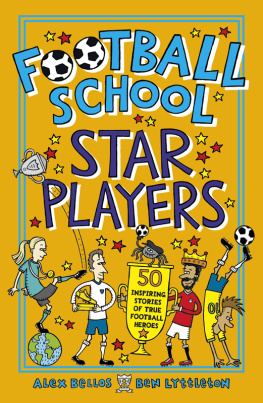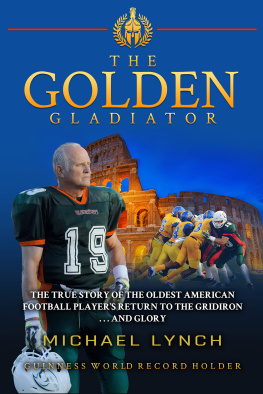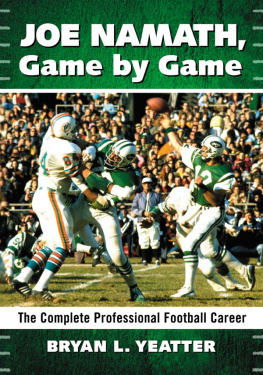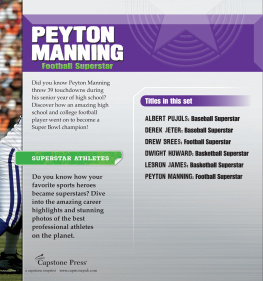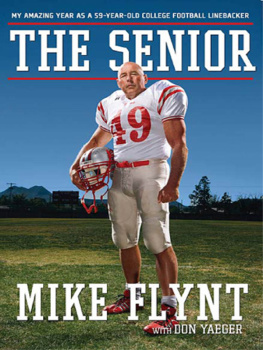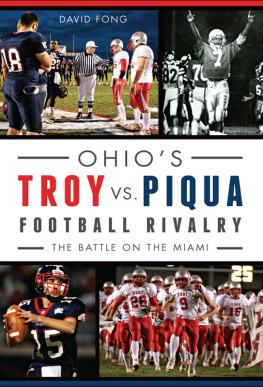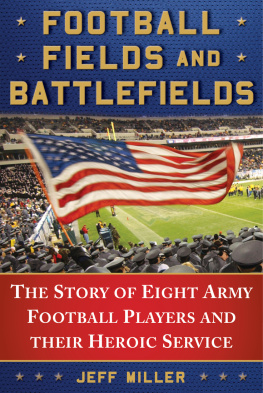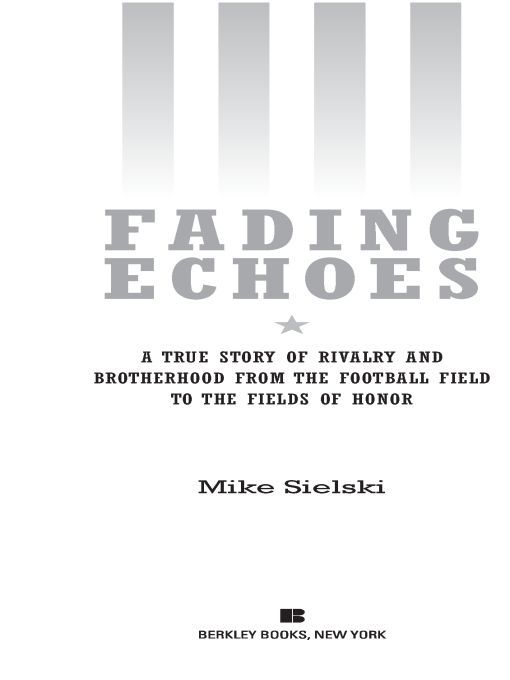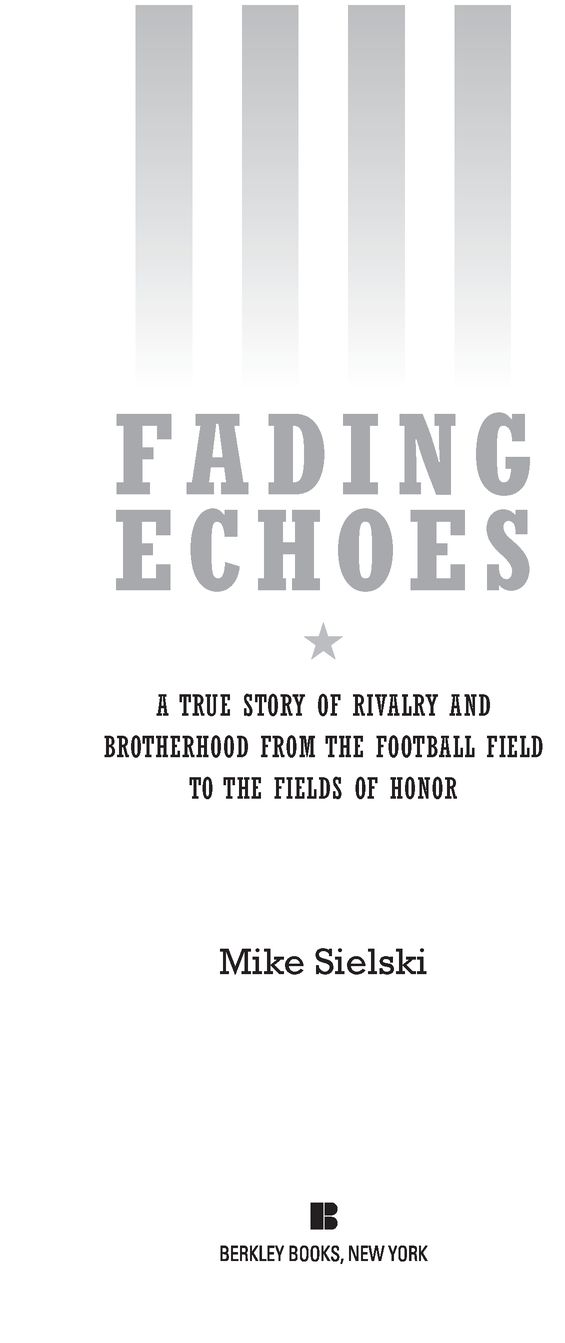Table of Contents
When I think of an officer in the Army, I think of someone who has a variety of talents and skills. An officer is smart, physically strong, mentally tough, and is highly motivated and capable. These admirable qualities create a leader.
Colby Umbrell
If youre an able-bodied male in Doylestown, youre probably going to play football.
Bryan Buckley
PREFACE
Connections
Until the dawn of the twentieth century, the notion that there was an organic link between athletics and military life was not part of the conventional wisdom of American culture. That fact may be difficult to understand now, if only because the language of the armed forces so permeates the language of sports, particularly of football. A quarterback is a field general. An athlete who plays in spite of physical or emotional trauma is a warrior. An important contest is often described as a battle. And on and on. These clichs are so embedded in the vernacular of athletics that nowadays we give barely a thought to the connection that they imply or to how that connection came to be made.
The idea that participation in sports may help prepare a young man for the rigors of war was never expressed more succinctly or eloquently than it was in a famous remark attributed to the Duke of Wellington: The battle of Waterloo was won on the playing fields of Eton. Fifty-four years after the Seventh Coalition vanquished Napoleon and his army, four years after Robert E. Lees surrender at Appomattox, Rut gers and Princeton played the first game of American intercollegiate football, in 1869, and the concept that athletic competition could cultivate the best attributes of a soldier now took tentative root in the countrys system of higher education. At the schools that were starting football games in the northeast, the virtues of the Civil War were supposed to be brought to bear, said Andy Kozar, the author of the book Football as a War Game. Self-sacrifice, courage, discipline, public spiritfootball was a place where schools could develop those kinds of things.
In 1890, military officers made the first inroads toward implementing athletics into the training of their men. Lt. C. D. Parkhurst, in a series of essays called The Practical Education of the Soldier, argued that physical training was the most vital aspect of a soldiers preparation for battle and that sports and exercise encouraged quick and unthinking obedience to orders. That same year, Army and Navy played their first football game against each other, and soon enough, the U.S. government began to use the spirit of Wellingtons words as a guiding principle for military and public policy. Two powerful forces contributed to this development: the prospect of war, and the desire for sex.
Under the presumption that the 1916 Mexican Revolution might lead to all-out war, President Woodrow Wilson invaded Mexico twice and marshaled the National Guard along the Mexican-American border. The 100,000 troops filled their downtime at Mexicos saloons and brothels, frequenting them so often that, in early 1917, Washington was receiving reports that Americas fighting forces were rife with venereal disease. In response, the military called on service organizations, such as the YMCA and the Red Cross, to create camps and events that emphasized participation and competition in sports and physical activity, including relay races, cross-country runs, and baseball and basketball leagues. U.S. military leaders considered the programs so successful that President Wilson, in 1918, wrote a formal proposal to make athletic participation compulsory in the Army. The military complied, and as historian Steven W. Pope wrote in 1995, Official integration of sport into military training sparked a wave of competitive team sports among civilians. By 1921, seventeen states had passed legislation man-dating some form of physical education in their schools. The value of athletics had been revealed to the entire nation.
Meanwhile, a little town in southeastern Pennsylvaniaa town whose only public school did not, as yet, have an athletic program of any kindwas growing. And year by year, the town would continue growing, continue changing, keeping time with the rhythms of a new America, where the games a child could play had become part of the rite of passage into adulthood. Come the close of the century, the town would find itself tethered to one sport in particular, and it would produce two young men who regarded their transitions from the playing field to the battlefield as seamless, as natural chapters in the stories of their lives.
ONE
Departure
Wednesday, July 26, 2006
Already he had written his own eulogy, typing it on his laptop in the sure and steady strokes of a Marine who knew, but did not fear, that he might soon die. The speech was a reckoning, an explanation of why he had decided to stop playing football and pursue a cause for which he was willing to sacrifice himself, and after he had finished it, Bryan Buckley kept writing. Five letters followed, each addressed to one of his five closest friends: Corey, Spratty, Ed, Matt, Dave. He wrote more. He provided instructions for his funeral. He did not want to be buried at Arlington National Cemetery. He did not want sadness or despair to mar the day. Go have some beers, he wrote. Laugh about the dumb stuff Ive done. He had printed out the letters and the eulogy, stuffed them into an envelope, sealed it, and given it to his brother-in-law Chris DiSciullo during his last visit to Doylestown, Pennsylvania, to the place where he had grown up. Bryan then had asked Chris and his wife, KimBryans eldest sisterto honor a single request: No one was to open the envelope unless something happened to him during his deployment in Fallujah, during the seven months he was scheduled to spend in the deadliest city in Iraq. These were his most private and personal thoughts and memories. These were his words to the people he loved... should he never see them again. He even told Kim that he had marked the envelope with a pen, creating, in effect, a bar code on it. If someone opened the envelope, read its contents, and resealed it before Bryan returned home, he would know.
His father, Bill, did not know that he had done all this, or whom Bryan wanted to deliver the eulogy. His mother, Connie, did. She knew what he had written and whom he had selected as his eulogist. Some things are just easier to tell mothers, and some things are easier to ask of fathersthings such as assembling weaponry, which is what Bill Buckley had been doing during the days before his sons deployment with the 2nd Battalion, 8th Marine Regiment. With much of Bryans gear strewn about his living room floor, Bill had sat on the couch amid the mess, looping survival cord through the magazines of 5.56-mm ammunition that Bryan would load into his M4 rifle. Having the magazines knotted to his weapon would allow Bryan to keep the bullets closer to his fingertips, reload more quickly, and lessen the chances that hed be left defenseless in the chaos of a desert firefight.
Bryans decision to become a Marine had surprised Bill. Sure, as a boy, Bryan was at his dads knee often, asking questions about Bills three years with the U.S. Army Security Agency, the electronic intelligence branch that was the antecedent to the National Security Agency. Bill told Bryan what stories he couldso much of his work was still classifiedand he taught Bryan to shoot a rifle when the kid was thirteen, taking him up to the hunting and fishing club that Bill belonged to in Pike County, Pennsylvania, near the Pocono Mountains. The kid bagged a deer his first time out. But football had been so integral to Bryans daily life, particularly when he was playing in high school for Central Bucks West, that until Bryan announced to his parents that he was giving up football and joining the military, Bill had never stopped to consider his sons future without the sport. Through Bryans middle school, high school, and college years, there always had been another game to play. Now, here was Bryan, the youngest of Bill and Connies four children, at twenty-six years old. Soft pink freckles still dotted his face. Splayed along the inside of his left forearm was a striking tattoo: a blue-black trident. At six feet one and 190 pounds, he was leaner and lighter than he had been as a high school or collegiate football player. Most of his light brown hair had been shorn away, and his physical training for the military had shaved away even the slightest bit of excess body fat, like stone from a sculpture, as if the Marines had stripped away all that had been unnecessary about him. Here was Bill Buckleys son, shoving clothes and gear into a duffel bag and a backpack, a lieutenant in the U.S. Marine Corps, 4th Platoon Commander in 2-8s Fox Company. Bill was proud of him. He didnt say so just then. He just kept looping that cord through those magazines.


